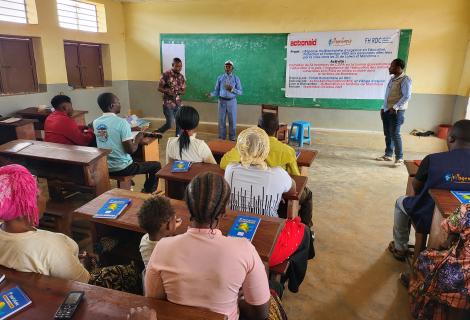Empowering Parent Committees to Protect Children and Ensure School Accountability.

Mandima: 56 school committee members trained by ActionAid DRC to reinforce good governance and safety in crisis-affected schools
The ongoing, devastating crisis in Ituri continues to severely restrict access to essential services, leaving over 100,000 children deprived of regular access to education since 2023. This instability demands not only urgent humanitarian aid but also resilient local leadership. In response, the Multi-sectoral Emergency Response Project is actively investing in community capacity. A key component of this effort was a critical two-day training held in Mandima from October 20 to 21, 2025, which successfully equipped 56 members of local Parent Committees (COPA) with reinforced skills in good governance, accountability, and proactive child protection. This initiative is a vital step toward ensuring safer, better-managed schools and restoring stability to education in crisis-affected zones.
Objectives: Fostering Accountability and Safety
The primary goal of the two-day session was to transform Parent Committees (COPA) from passive groups into active drivers of educational quality and safety. The training was built around three essential objectives:
- To establish a clear understanding of good governance principles, specifically transparency, accountability, participation, and inclusion, within school management.
- To equip COPA members with the skills necessary to proactively identify, report, and help prevent violations of children's rights in the school environment.
- To forge a strong, collaborative triangle between parents, teachers, and community structures for the holistic security and well-being of the children.
Methodology: Learning by Doing
The activity, which engaged 56 dedicated community members (40 men and 16 women), utilized an intensive, participant-centered approach to ensure knowledge was practical and applicable. The training modules covered the core principles of school governance and the roles and responsibilities of the committees.
Key methodologies included:
- Dynamic presentations followed by robust, participatory group discussions.
- Analyzing actual school management and child protection scenarios to build critical thinking.
- Developing collective and individual commitments, culminating in the elaboration of tangible community action plans for immediate application in their respective schools.
Achievements: Immediate and Tangible Results
The training successfully delivered measurable results that promise long-term institutional improvement:
- 56 COPA members received comprehensive training, resulting in a significantly better grasp of their roles in oversight, participation, and financial accountability within the school.
- Committees now possess reinforced knowledge of children's rights and are familiar with the specific reporting mechanisms available for violence and protection concerns.
- The dialogue initiated during the training helped to solidify and improve working relationships between parents, teachers, and school administration, laying the foundation for a more unified educational environment.
- The finalized community action plans serve as a roadmap for improving governance and child protection across all partner schools.